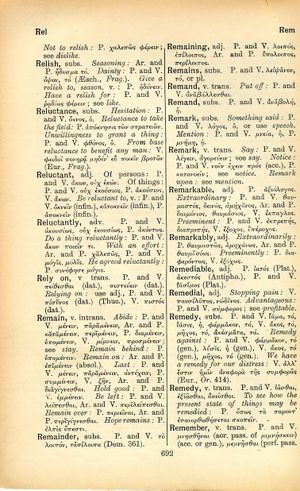reluctance: Difference between revisions
From LSJ
Έγ', ὦ ταλαίπωρ', αὐτὸς ὧν χρείᾳ πάρει. Τὰ πολλὰ γάρ τοι ῥήματ' ἢ τέρψαντά τι, ἢ δυσχεράναντ', ἢ κατοικτίσαντά πως, παρέσχε φωνὴν τοῖς ἀφωνήτοις τινά –> Wretched brother, tell him what you need. A multitude of words can be pleasurable, burdensome, or they can arouse pity somehow — they give a kind of voice to the voiceless.
(Woodhouse 4) |
(CSV4) |
||
| Line 1: | Line 1: | ||
{{ | {{Woodhouse1 | ||
| | |Text=[[File:woodhouse_692.jpg|thumb|link={{filepath:woodhouse_692.jpg}}]]'''subs.''' | ||
<b class="b2">Hesitation</b>: P. and V. [[ὄκνος]], ὁ. | |||
<b class="b2">Reluctance to take the field</b>: P. [[ἀπόκνησις]] τῶν στρατειῶν. | |||
<b class="b2">Unwillingness to grant a thing</b>: P. and V. [[φθόνος]], ὁ. | |||
<b class="b2">From base reluctance to benefit any men</b>: V. φειδοῖ πονηρᾷ μηδένʼ [[εὖ]] ποιεῖν βροτῶν (Eur., <b class="b2">Frag.</b>). | |||
}} | }} | ||

